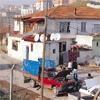Pessimism on the city’s fringe
Hurriyet Daily News With Wires

refid:10558159 ilişkili resim dosyası
According to research by Konda, a well-known research company, "varoş" dwellers are among the most pessimistic group of people in Turkey. Varoş dwellers believe their own lives, and life in Turkey generally, has worsened in the last five years and will continue to worsen over the next five years.
Young people under the age of 35 are slightly more hopeful about the future. When asked how they would classify themselves among others in the country in terms of income and welfare, 95 percent said they saw themselves as middle or lower class. As to how happy they felt about their general condition of life, 54 percent said they were happy, while 11 percent felt unhappy, similar to the country overall.
Those varoş dwellers surveyed said they rarely went out as a family to have dinner or attended cultural activities. Out of those surveyed, 37 percent said they had never had a meal out with friends, while 52 percent said they had never been to the movies or the theater and 51 percent had never celebrated the new year. Men who live in varoş areas visit local coffee houses as commonly as men in villages, 20 percent said they always visited and 22 percent said they frequently visited.
Varoş dwellers said their ability to save money was low, but if they could invest they would do so in real estate. Many of those surveyed, 24 percent, had never been to a bank to conduct a transaction. Among the varoş population, playing a musical instrument, physical exercise and other hobbies is uncommon. The majority said they followed a TV series and more than 65 percent watched television for more than three hours each day.
When asked about concerns in their daily lives, varoş residents were revealed to be the most anxious group in Turkey. The order in which varos residents listed their concerns was the same as the order nationally, but anxiety was higher. They were scared of their children or family members not being able to get the education they desired, about not having, not being able to have or losing their social security or retirement fund, and about being impoverished and needy, in that order.
As far as attitudes toward conservatism and nationalism went, varoş residents are the most resistant to new developments. They were revealed to be more unreceptive to new ideas, products and technologies than villagers were. Their emotional response to change was very high and their cognitive and behavioural responses were negative. Varoş dwellers were the most frustrated group regarding changes that should be made for the good of Turkey. They also held the most negative views about supporting new ideas or hoping for a positive contribution to their lives through new ideas. Young people under the age of 35 from the slums had an even greater negativity toward new developments.
The varoş population is one of the most conservative groups in the country. On matters such as the national economy’s foreign expansion or Turkey intervening more actively in global issues, they hold the most negative views.
Varoş residents were also the least supportive of Turkey becoming a member of the European Union. A union to be formed with Turkic nations was slightly more appealing to them.
MAJORITY COMPLAIN BUT FEW GO BACK
by Umay Aktaş Salman / Radikal
The view from Adile Bozkurt’s home is of a freeway. Her Istanbul consists of what she can see from behind the glass. Bozkurt, 39, migrated from Tokat 17 years ago and the only place she has seen outside her neighbourhood is the Eyüp Sultan neighborhood.
She thinks about her homeland. "You should see how it is there, it is beautiful. I recommend you visit," she said. There was a twinkle in her eyes when she mentioned Tokat, but she said she would not think of returning even if she was given an opportunity.
Bozkurt said she could not stand the noise and the overcrowding in Istanbul. She said, "I am used to it now that we have settled. The location of our house is fine. I would not leave." Her only social activity is visiting her neighbor with her sewing bag. She takes a vacation every three or four years, which entails a trip to her hometown. The family gets by and tries to finance the education of their three children with the husband’s YTL 1,200 wage selling bottled water. Their biggest desire is for their children to receive an education and leave this life squeezed into the two-room shack behind.
BUYING FRUIT PROVES LUXURY ON A TIGHT BUDGET
Radikal
Two young girls were walking with plastic bags in their hands. The bags contained ingredients for a family of 12 for two weeks. The family is large, but the budget for shopping is limited. They have to set the limit for two weeks at YTL 50. Their pot will mostly contain winter vegetables. Fruit is not included in their limited budget. Local markets are the first choice for varoş residents when shopping for food and clothing. The Thursday market in the Tahtakale district of Avcılar now has a subdued appearance with the current economic turmoil.
In order not to scare customers away, fruit and vegetables sellers are now pricing their goods by the half kilogram. A woman who approached a cucumber stall where the tag read YTL 0.75 said, "I thought 0.75 was for a kilogram. It is expensive," but helplessly she started picking out cucumbers regardless. The owner of an underwear stall who provided for a family of five, complained about the lack of business since the end of the Muslim fasting month of Ramadan. The stallholder said business was down for everyone. "I have not bought new goods since Ramadan, you can guess how rare a sale is." It is 1:30 p.m. and I still have not made my first sale today."
Ercan Küknaroğlu, 32, a stallholder for 12 years, sells shoes, slippers and boots. The most expensive product at his stall was priced at YTL 35 for a pair of boots. It is possible to buy shoes of all sizes for YTL 10 to 15. He said he could not make YTL 20 a day even though he worked from 6 a.m. to 9 p.m. "There are times when we work 18 hours a day. If we worked at a government office, we would earn double overtime," he said. Gülçin Zengin, the owner of a sweater stall said there had been no business for a month and a half. "Our prices range from YTL 5 to 15. Customers, however, even find these prices expensive and bargain," she said.
Ayşe Dengi, who shopped at the market for her family of five, said even market shopping is expensive from time to time. "We cannot shop every week, only every two weeks. Our bazaar budget is sometimes YTL 30, sometimes YTL 50. Shopping at a store is a luxury. We can only buy goods from the supermarket by keeping track of the days when discounts are available." Dengi had her sister with her who was looking for a skirt for bayram. She wandered from stall to stall to find a skirt cheaper than those in stores for YTL 40. She found some skirts for YTL 15 to 20, but she did not like them.
ECONOMY CRISIS HITS THOSE IN VAROŞ HARDER
by Yonca Cingöz -Radikal
Stat Street is at the far end of Piyalepaşa. There are many people from Rize, Giresun and Sivas here. There has not been any migration in recent times but the district has changed a lot over the last two decades.
Salih Mutlu opened a garage on the street in 2001, but he is not happy with it anymore. "If I would compare 2001 with 2008, business is down 170 percent," he said. "There was a crisis back then too. This one is different. One month before the Feast of the Sacrifice of 2001 we were working perfectly. Now, we are sitting down. We are thinking of pulling down the shutters. I charge YTL 200 for workmanship which is worth YTL 500 and the customer still asks to pay in instalments."
Mutlu is angry with the government. He said that with his rented shop he did not work for himself, but for the state. He is the sole provider for his family with three children. Deducting the rent of his house in Hasköy, he has a monthly budget of between YTL 150 to 200. His landlord is a relative so his rent is comparatively low. Otherwise, there are no houses below YTL 700 in the neighborhood. "We are the victims of the crisis. The state’s hands are in citizens’ pockets," he said.
Sinan Peliç, also from Rize and a father of three, hangs around Mutlu’s garage almost every day. "With us, our wives do not work," he said. He has worked as a haberdasher, as a white-goods salesman and as a chauffeur for a bank. A marble tradesman, who he most recently worked for as a chauffeur, had to let him go due to financial difficulties. He has been unemployed for three months. "The last place I checked for work was a tourism agency. The pay was YTL 600, the shift was seven days a week, 24 hours a day with no holidays and no insurance. If you do not like it, there are ones who do, they told me. They mostly prefer pensioners. Romanian and Turkmenistan immigrants are being employed illegally at marble quarries and sand depots. They sleep in bunkers with just enough food to survive, "Peliç said.
















